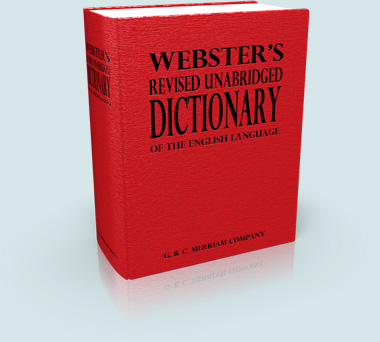Webster's Revised Unabridged Dictionary (1913)

(For the 1828 original work by Noah Webster, see here.)
This early 20th century dictionary is one of the last great dictionaries to retain a major focus on the use of English words in Scripture.
The Revised Unabridged Dictionary of the English Language is a revision and expansion of Noah Webster's original work. This particular edition was edited by Noah Porter (D.D., LL.D. of Yale University) in 1900 as the International Dictionary and published in the United States in 1913 by G. & C. Merriam.
The 1913 retains the bulk of Webster's material with significant expansion; this edition contains twice the number of entries and more thorough etymologies.
- Over 120,000 words defined.
- Identical headwords are organized under a single entry (for more than 98,000 entries).
- Over 48,000 cross-linked definitions.
- Over 4,300 linked Biblical references.
The 1913 is an excellent dictionary and extremely helpful in understanding the language of many of the literary works included in SwordSearcher.
Sample definitions:
Promʺise, a. [F. promesse, L. promissum, fr. promittere, promissum, to put forth, foretell, promise; pro forward, for + mittere to send. See Mission. ]
1. In general, a declaration, written or verbal, made by one person to another, which binds the person who makes it to do, or to forbear to do, a specified act; a declaration which gives to the person to whom it is made a right to expect or to claim the performance or forbearance of a specified act.
For if the inheritance be of the law, it is no more of promise: but God gave it to Abraham by promise. Ga 3:18.
2. (Law) An engagement by one person to another, either in words or in writing, but properly not under seal, for the performance or nonperformance of some particular thing. The word promise is used to denote the mere engagement of a person, without regard to the consideration for it, or the corresponding duty of the party to whom it is made. Chitty. Parsons. Burrill.
3. That which causes hope, expectation, or assurance; especially, that which affords expectation of future distinction; as, a youth of great promise. Shak.
My native country was full of youthful promise. W. Irving.
4. Bestowal, fulfillment, or grant of what is promised.
He . . . commanded them that they should not depart from Jerusalem, but wait for the promise of the Father. Ac 1:4.
―
A‧toneʺment, n.
1. (Literally, a setting at one.) Reconciliation; restoration of friendly relations; agreement; concord. [Archaic]
By whom we have now received the atonement. Ro 5:11.
He desires to make atonement
Betwixt the Duke of Gloucester and your brothers. Shak.
2. Satisfaction or reparation made by giving an equivalent for an injury, or by doing of suffering that which will be received in satisfaction for an offense or injury; expiation; amends;— with for. Specifically, in theology: The expiation of sin made by the obedience, personal suffering, and death of Christ.
When a man has been guilty of any vice, the best atonement be can make for it is, to warn others. Spectator.
The Phocians behaved with, so much gallantry, that they were thought to have made a sufficient atonement for their former offense. Potter.
Day of Atonement (Jewish Antiq.), the only fast day of the Mosaic ritual, celebrated on the tenth day of the seventh month (Tishri), according to the rites described in Leviticus xvi. Also called Yom Kippur.
―
Sancʺti‧fy, v. t. [imp. & p. p. Sanctified; p. pr. & vb. n. Sanctifying.] [F. sanctifier, L. sanctificare; sanctus holy + -ficare (in comp.) to make. See Saint, and -fy.]
1. To make sacred or holy; to set apart to a holy or religious use; to consecrate by appropriate rites; to hallow.
God blessed the seventh day and sanctified it. Ge 2:3.
Moses . . . sanctified Aaron and his garments. Le 8:30.
2. To make free from sin; to cleanse from moral corruption and pollution; to purify.
Sanctify them through thy truth. Joh 17:17.
3. To make efficient as the means of holiness; to render productive of holiness or piety.
A means which his mercy hath sanctified so to me as to make me repent of that unjust act. Eikon Basilike.
4. To impart or impute sacredness, venerableness, inviolability, title to reverence and respect, or the like, to; to secure from violation; to give sanction to.
The holy man, amazed at what he saw,
Made haste to sanctify the bliss by law. Dryden.Truth guards the poet, sanctifies the line. Pope.
―
Sancʹti‧fi‧caʺtion, n. [L. sanctificatio: cf. F. sanctification.]
1. The act of sanctifying or making holy; the state of being sanctified or made holy; esp. (Theol.), the act of God's grace by which the affections of men are purified, or alienated from sin and the world, and exalted to a supreme love to God; also, the state of being thus purified or sanctified.
God hath from the beginning chosen you to salvation through sanctification of the Spirit and belief of the truth. 2Th 2:13.
2. The act of consecrating, or of setting apart for a sacred purpose; consecration. Bp. Burnet.
This text is part of the SwordSearcher Deluxe Study Library.
Module type: Book
Module abbreviation: Web1913
The Deluxe library includes hundreds of volumes. Discover how fast, convenient, and powerful software is compared to mere online study tools.
See Also:

